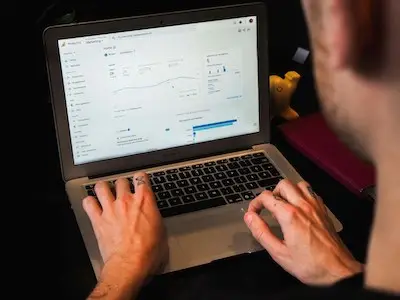You may have noticed on your last login to Google Analytics that your beloved conversions have changed their name to “key events” – well, this is an article about that.
Google Analytics has introduced a terminology shift from “conversions” to “key events,” marking a pivotal change in how interactions are tracked and interpreted. This article delves into this shift, explaining its reasons, technical differences, and implications for digital marketers.
Table of Contents
Understanding the Shift
In the past, the term “conversions” in digital analytics only referred to specific predetermined user actions considered valuable, such as making a purchase or signing up for a service. Unfortunately, this narrow definition often led to overlooking other essential user interactions that could significantly impact customer behaviour and business outcomes. To address this issue, Google has changed the term “conversions” to “key events,” which encompasses a wider range of valuable user interactions for more comprehensive analysis.
The Reasons for Change
The change in terminology reflects a broader shift in digital analytics. The shift is from a simple, transaction-focused view to a more nuanced, interaction-based approach. By adopting the term “key events,” businesses can customise their analytics to capture a wider range of actions. These actions can include video views, downloads, and custom interactions that don’t necessarily lead to a sale. However, they are an indicator of user engagement.

Technical Insights: GA4 vs. Universal Analytics
Google Analytics 4 (GA4) has become an essential tool in facilitating a new approach to conversion tracking. Unlike its predecessor, Universal Analytics (UA), which restricted conversion tracking to predefined categories, GA4 offers a flexible framework where virtually any event can be marked as a key event. This flexibility allows businesses to adapt monitoring to align more closely with their unique goals and user behaviours.
So, what can GA4 Events track?
There are four main event categories in GA4, and it delves deeper into custom events, which is a powerful tool for tailoring data collection to specific business needs.
Automatically Collected Events
Google Analytics 4 (GA4) automatically tracks a range of basic user interactions without requiring any additional configuration from the user. These interactions include page views, first-time visits, session starts, and user engagement metrics. This automatic data collection ensures that essential user interactions are always monitored, providing a fundamental baseline for analytics.
Enhanced Measurement Events
Enabling enhanced measurement in GA4 settings allows marketers to gather data on various user interactions automatically. This includes clicks on outbound links, file downloads, video engagement, and site searches. Enhanced measurement events help bridge the gap between simple page interactions and more complex user behaviours.
Recommended Events
Google offers a selection of suggested events customised to different industries, such as retail, travel, and gaming. These suggested events are not automatically tracked but recommended because they are aligned with common business models and objectives. For instance, e-commerce sites can use the ‘add_to_cart’ event, while ‘begin_checkout’ is recommended for other businesses. Although it is not compulsory to implement them, doing so can provide more comprehensive insights into industry-specific user actions.
Custom Events
Custom events are the most flexible way to track events in GA4. They enable businesses to define and record unique interactions that are particularly relevant to their strategic objectives. Whether tracking the success of a distinctive marketing campaign, monitoring engagement on a new interactive feature, or understanding user paths through a custom funnel, custom events allow marketers to personalise analytics to meet their specific needs.

How can these track engagement?
Measuring user engagement with GA4 Events includes tracking engagements like time spent on a page, scroll depth, video engagement, interaction with elements, and form interactions. By analysing these metrics, website owners can gain insights into user behaviour and engagement, which can be used to make targeted improvements and strategies. For example, if a website owner notices that users are dropping off after filling out a particular form field, they can modify the form to improve the user experience. Similarly, if a website owner notices that users are spending more time on pages with certain elements, they can create more content that incorporates those elements. Tracking these metrics helps website owners better understand their audience and create a more effective and engaging online presence. Overall, GA4 provides website owners with a powerful tool to track and analyse user engagement, which can help them improve their website’s performance and ultimately drive more business.
Custom events are an excellent way to track user interactions unique to your digital environment. Whether it’s a distinctive marketing campaign, a new feature on your site, or a complex user journey, custom events can capture these nuances in user behaviour.
One of the powerful capabilities of GA4’s custom events is integrating data from multiple sources. This could include data from different websites, applications, CRM Software or even offline data sources. By collecting this data in GA4, businesses can achieve a holistic view of how users interact across different platforms and touchpoints.
The data collected through key events and custom metrics can be valuable in optimising user experience. By understanding the paths that users take and the actions they find most engaging, businesses can tailor their content and functionalities to better meet user needs and preferences.
Strategic Implications
By introducing key events, marketers can refine their measurement strategy more precisely. This approach promotes a shift from considering success as a mere conversion rate to understanding a spectrum of user engagement. Now, businesses can measure the effectiveness of various channels and campaigns based on the result, quality, and depth of user interactions across their customer journey. GA4 Key Events has also opened up several strategic implications for marketers.
Widening the Gap Between Google Ads and Analytics
Google Analytics Key Events introduce a nuanced layer of user interaction tracking that diverges from traditional conversion metrics. This update further distinguishes Google Analytics from Google Ads, allowing for a broader spectrum of interactions to be monitored independently of direct advertising conversions.
In Google Ads, the expansion constitutes a conversion that includes more than just data tracked through GA4, emphasising its effectiveness in advertising. Meanwhile, GA4 Key Events identify key interactions that do not necessarily result from direct advertising efforts, enabling a more holistic view of user engagement beyond lead generation and ad conversions.
Enhanced Reporting Capabilities
The addition of Key Events has significantly enhanced the reporting capabilities of Google Analytics. With this update, marketers can now access more detailed insights into the customer journey by distinguishing between general interactions and those critical to the conversion process. This level of granularity allows for more effective trend mapping and a deeper understanding of the behaviours that lead up to conversions. As a result, the analytics environment becomes more nuanced and actionable, providing a clearer view of user paths and interaction patterns and facilitating data-driven decisions.
Impact on Content-Driven Businesses
The shift to Key Events represents a strategic advancement for businesses prioritising engagement over direct online conversions. This is particularly relevant for content-driven platforms and brands that emphasise user interaction. This change recognises the value of different types of user actions contributing to business success, expanding the scope of what is considered impactful within digital spaces. By acknowledging a more comprehensive array of important user activities, Google Analytics is better equipped to serve organisations whose primary metrics revolve around user engagement and content interaction.
Improved Market Responsiveness
Key Events are an essential part of data analysis as they help to break down user interactions into smaller, more specific activities. This allows marketers to develop targeted reporting tools and dashboards that quickly respond to changes in the market and user behaviour. By tracking these interactions separately from conversions, businesses can optimise their strategies dynamically, focusing on nurturing potential leads and enhancing user engagement strategies.
Setting Up and Tracking Key Events
Firstly, all your current conversions in GA4 will be changed to Key Events; there’s nothing for you to do here.
Setting up key events from scratch in GA4 involves defining what interactions to track, configuring event parameters, and assigning value to these events. Marketers must decide which interactions are critical to their strategy and set up their analytics to capture these events. This might include configuring custom parameters or using Google Tag Manager to manage complex tracking setups.
Leveraging GA4 Key Events
- Identify Strategic Interactions: Identify which user actions most indicate engagement or intent.
- Use Custom Configurations: Use GA4’s flexibility to configure custom event parameters that provide deeper insights.
- Align with Business Objectives: Ensure that the key events you track are aligned with broader business objectives, enhancing your ability to measure actual impact whether you want to understand core metrics like lead generation, or more subtle interactions like which people arrived on your website from your email signatures. Each Key Event can be carefully crafted.
- Continuously Refine: Use the data collected to refine your approach, optimising campaigns and strategies based on user behaviour.
The shift from conversions to key events in Google Analytics and Google Ads represents a fundamental change in how digital interactions are measured and valued. It offers marketers a more comprehensive toolkit for understanding user behaviour, aligning more closely with the multifaceted nature of user interactions on the web today. As businesses navigate this new terrain, adapting and leveraging these changes will be crucial in gaining a competitive edge in the digital marketplace.






